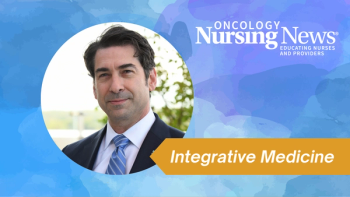
- December 2021
- Volume 15
- Issue 6
The Oncology Nurse’s Role in Preparing Patients and Caregivers for Postoperative Recovery
As minimally invasive surgery for lung cancer increases in popularity, more patients are recovering at home, expanding the need for personalized caregiver education.
Although surgery is an option for some patients with lung cancer, unmet needs related to postoperative recovery can negatively affect a patient’s quality of life and increase the family caregiver’s burden, explained Virginia Sun, PhD, MSN, RN, associate professor in the Division of Nursing Research and Education at City of Hope, a cancer research and treatment organization near Los Angeles, California.
To address these needs, Sun and her colleague, Jae Kim, MD, assistant professor and chief of the Division of Thoracic Surgery at City of Hope, launched a 5-year study in 2018 focusing on how to best support family care-givers after a loved one has undergone surgery for lung cancer. Sun and Kim developed the study after working on a previous research project that showed although standard intervention and education methods, such as videos and printed materials, were helpful for patients, they weren’t as helpful for caregivers.
Sun’s study examines the differences between a caregiver control arm that receives traditional education materials and one that receives these materials as well as face-to-face sessions with an oncology nurse to help address specific patient and caregiver needs and problems.1
Although some oncology centers have nurse navigators that work with family caregivers, that isn’t the case with all medical centers. Sun said it’s important for all oncology nurses to ensure good outcomes for patients with lung cancer by ensuring their caregivers are well prepared.
With an increase in minimally invasive surgery for lung cancer, the length of hospital stays has decreased, with patients now typically spending 2 to 3 days in the hospital after minimally invasive surgery. Although many patients prefer to recover at home, Sun said when caregivers aren’t adequately prepared, patients with lung cancer can experience complications that result in being readmitted to the hospital.
Caregiver preparation often consists of videos and print materials developed by groups, such as the American Society of Clinical Oncology. Although those resources are informative, caregivers often need more personalized support, Sun said.
“Oncology nurses can help families and family caregivers by simply asking them about their needs and how they are doing,” she said. “Many family caregivers report they’ve never been asked about their needs. A simple question can lead to improved assessment, provision of relevant information, and referrals for support to families.” Sun recommended that oncology nurses determine who will be the primary family caregivers for a patient, and whether there will be more than 1 family member taking on this role, and assess their knowledge needs and caregiving preparedness. “Most family members are interested in how they can better prepare for the day of surgery and the recovery process, and what to expect during these times,” Sun said. “If possible, nurses can think about how we can best use the preoperative period to educate and prepare families for what’s ahead and to also encourage care- givers to think about their own self-care plan, as many family caregivers may be coping with their own illness.”
Empowering Caregivers
Shayne Cardozo, RN, nurse coordinator for the thoracic surgery and oncology clinic at the University of California, San Francisco Health, works with many patients with lung cancer and their family caregivers and strives to give them the information and support they need after they’re discharged from the hospital. “The quality of life for these patients with lung cancer should be the same or better after surgery,” Cardozo said. “We stress an active recovery where, after receiving approval from their doctor, they engage in walking and deep breathing exercises. The more they can do, the faster they will recover.”
In addition, Cardozo demonstrates how to properly use devices, such as an incentive spirometer, so patients can expand their lungs to help them breathe more deeply and fully. Doing this, as well as regular breathing and coughing exercises, also helps patients to keep their lungs active during their recovery and prevents complications, such as pneumonia.
Cardozo also works with patients to develop a personal plan to treat postsurgery pain and address common adverse events, such as constipation caused by pain medications. “At-home patients tend to fall behind on their pain medications,” she said. “Many are fearful they will become addicted to pain medications, so it’s important to let them know prescription opioids are generally safe when prescribed by their doctor and taken for a short period of time.”
Cardozo sees the role of a family caregiver as that of a personal trainer who offers encouragement and support to their loved ones by ensuring they follow postoperative instructions, take their medications, and practice breathing exercises. She also advises care- givers to call her in the event they have questions or if their family member experiences a fever, discharge from the incision site, chest pain, or shortness of breath.
Sometimes the most important tool that oncology nurses can provide caregivers is reassurance. “Caregivers need to feel empowered that they are part of the health care team and have the tools and answers in place to care for their loved one,” Cardozo said.
Reference
Prieto R, Ferrell B, Kim JY, Sun V. Self-management coaching: promoting postoperative recovery and caregiving preparedness for patients with lung cancer and their family caregivers. Clin J Oncol Nurs. 2021;25(3):290-296. doi:10.1188/21.CJON.290-296
Articles in this issue
about 4 years ago
Continuing Education: December 2021about 4 years ago
Cancer Care Costs US Billions— Mostly in Drug Expensesover 4 years ago
COVID-19 Pandemic Emphasizes Disparities in Cancer CareNewsletter
Knowledge is power. Don’t miss the most recent breakthroughs in cancer care.









































